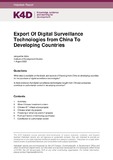| dc.contributor.author | Hicks, Jacqueline | |
| dc.date.accessioned | 2022-09-20T11:44:58Z | |
| dc.date.available | 2022-09-20T11:44:58Z | |
| dc.date.issued | 2022-08-01 | |
| dc.identifier.citation | Hicks, J. (2022). Export of digital surveillance technologies from China to developing countries. K4D Helpdesk Report. Institute of Development Studies. DOI: 10.19088/K4D.2022.123 | en |
| dc.identifier.uri | https://opendocs.ids.ac.uk/opendocs/handle/20.500.12413/17644 | |
| dc.description.abstract | There is evidence to show that Chinese companies, with some state credit backing, are selling digital surveillance technologies to developing countries, which are then sometimes used in authoritarian practices. However, there is little direct evidence to show that surveillance technologies sold by Chinese companies have more authoritarian potential than the technologies sold by non-Chinese companies.
Some researchers define “surveillance technologies” as including any form of digital infrastructure. There is data to show that developing country governments are contracting Chinese companies to build digital infrastructures.
Other researchers define “surveillance technologies” as smart city projects. It is estimated that in 2019, Chinese smart city technologies have been purchased in over 100 countries worldwide. Other researchers look at more specific elements of smart cities: There are estimates that the “AI surveillance” components of smart cities have been purchased in 47-65 countries worldwide, and the “data integration” security platforms in at least 80 countries.
None of these figures imply anything about how these technologies are used. The “dual use” nature of these technologies means that they can have both legitimate civilian and public safety uses as well as authoritarian control uses.
There is evidence of some governments in Africa using Chinese surveillance technologies to spy on political opponents and arrest protesters. Some authors say that some Chinese smart city projects are actually not very effective, but still provide governments with a “security aesthetic”. Research also shows that Chinese smart city technologies have been sold mostly to illiberal regimes.
However, in the wider context, there is also ample evidence of non-Chinese surveillance technologies contributing to authoritarian control in developing countries. There is also evidence that UK companies sell surveillance technologies to mostly illiberal regimes.
Some reports consulted for this rapid review imply that Chinese surveillance technologies are more likely to be used for authoritarian control than those sold by non-Chinese companies. This analysis is largely based on circumstantial rather than direct evidence. They rely on prior judgements, which are themselves subject to ongoing enquiry in the literature:
Almost all of the reports consulted for this rapid review say that the most important factor determining whether governments in developing countries will deploy a particular technology for repressive purposes is the quality of governance in the country. No reports were found in the literature reviewed of Chinese state pressure on developing countries to adopt surveillance technologies, and there were some anecdotal reports of officials in developing countries saying they did not come under any pressure to buy from Chinese companies. | en |
| dc.description.sponsorship | Foreign, Commonwealth and Development Office (FCDO) | en |
| dc.language.iso | en | en |
| dc.publisher | Institute of Development Studies | en |
| dc.relation.ispartofseries | K4D Helpdesk Report;1190 | |
| dc.rights.uri | https://www.nationalarchives.gov.uk/doc/open-government-licence/version/3/ | en |
| dc.subject | Health | en |
| dc.title | Export of Digital Surveillance Technologies From China to Developing Countries | en |
| dc.type | Helpdesk | en |
| dc.rights.holder | © Crown copyright 2022 | en |
| dc.identifier.doi | 10.19088/K4D.2022.123 | |
| dcterms.dateAccepted | 2022-08-01 | |
| rioxxterms.funder | Default funder | en |
| rioxxterms.identifier.project | K4D | en |
| rioxxterms.version | VoR | en |
| rioxxterms.versionofrecord | 10.19088/K4D.2022.123 | en |
| rioxxterms.funder.project | 0986883a-6d0f-4bb8-9c46-5e0682934d65 | en |

